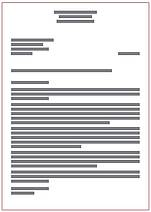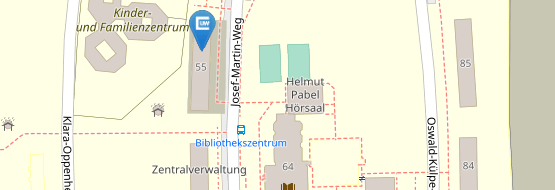Application advice
On this page, we would like to provide you with a brief summary of the most important facts about your application. The information here is deliberately kept very short, as there are already countless helpful publications on the subject (you can find our material in the constantly growing Career library) and because, in our experience, many student questions are very specific. We are therefore happy to clarify questions of this kind in a personal discussion.
What is a competence profile?
A skills profile records the current status of your skills acquisition, i.e. it visualises the knowledge, skills and abilities that you have already acquired, formally or informally. The acquisition of competences may have taken place as part of your (academic) education, but also outside school and university, and includes both theoretical knowledge and practical experience.
The distinction between four areas of competence has become established for the differentiated description of vocational competences: Professional competence includes specific knowledge and skills that you need to perform typical occupational activities. This also includes context-specific knowledge that you have acquired in a particular field of activity, industry or position. Methodological competence describes cognitive and metacognitive skills that you can apply across situations to solve complex tasks independently - for example, by applying certain working techniques, procedures or learning strategies. Social competence includes the skills you need to successfully achieve goals and plans in social interaction situations. Your social competence is reflected, for example, in your cooperative or communicative behaviour. Self-competence refers to your attitudes, values and motives that influence your work behaviour. It also includes self-awareness and self-organisation skills.
Your competences describe what you are capable of. They only becomes visible through concrete behaviour and actions. So always ask yourself: How can others recognise my professional, methodological, social and personal skills? What am I actually doing when I describe myself as a ‘team player’, ‘flexible’ or ‘analytical’?
What is a skills profile good for?
A skills profile ...
- contributes to a realistic self-assessment and self-presentation by making your individual strengths and interests visible.
- helps you to develop your individual profile during your studies - for example through the targeted selection of specialisations, internships or part-time jobs.
- supports you identify your personal development potential.
- makes it easier to locate yourself on the current labour market and find a suitable position.
- provides an important basis for the preparation of application documents, not least for writing unsolicited applications.
How do I create my individual competence profile?
In order to actively and successfully shape the process of creating a professional profile, it is advisable to get to know your strengths and interests at an early stage. The Career Centre at the University of Würzburg offers specific services for this purpose. In coaching sessions and workshops, you will identify your individual competencies and present them in a way that is effective for your career.
Literature tips: E-Books in the University Library
- Kauffeld, Simone: Arbeits-, Organisations- und Personalpsychologie für Bachelor. Springer. Berlin 2019.
- Nerdinger, F. W., Blickle, G., Schaper, N. (42019). Arbeits- und Organisationspsychologie (pp. 235-249). Berlin: Springer.
- Schmidt-Lauff, Sabine: Menschen verstehen – Potenziale erkennen : Die Systematik professioneller Bewerberauswahl und Mitarbeiterbeurteilung. W., Verlag Bertelsmann. Bielefeld 2025.
- Stracke, Friedemann (52023). Menschen verstehen – Potenziale erkennen. Wiesbaden: Springer.
Literature tips: Books in the Career Library
- Bredemeier, Karsten: Rhetorik auf den Punkt gebracht. Die Grundregeln überzeugender Kommunikation. Goldmann. München 2014.
- Krengel, Martin: Golden Rules: Erfolgreich Lernen und Arbeiten. Alles was man braucht. Selbstcoaching. Motivation. Zeitmanagement. Konzentration. Organisation. Eazybookz. Berlin 32012.
- Reynolds, Garr: Zen oder die Kunst der Präsentation. Mit einfachen Ideen gestalten und präsentieren. Addison-Wesley. München 2008.
The first step in the process of finding a job is to take a look at ourselves and ask ourselves the following questions:
- What can I do? What can I not do?
- What do I like to do? What interests me?
- What have I learned and accomplished so far?
- What is important to me in life?
- How do others judge my abilities? How do others perceive my personality?
- What do I want to learn? What do I want to achieve?
All these questions serve to clarify important cornerstones of your profile and thus of your application basis: Competences, interests, values, external assessment, career goals.
Once you have made a thorough inventory of youselve, you know what you bring to the table, but also what we can demand. Only then can you look for possible career options and throw our hat in the ring. Two questions are important here: Which job requirements correspond with my skills and under which job titles do they hide?
For our research, we can and should consider and make use of numerous and diverse offers and possibilities:
- Obtain labour market information and research occupational fields (e.g. via Agentur für Arbeit/Berufenet)
- Search job offers via online job portals
- Directly on company websites, Social Media (Linkedin etc.)
- Activate your own network! (keyword unpublished job advertisements!)
Create a list: Who do I know where?
Inform friends, family, other contacts, contact, ask questions, ask around
Visit relevant (company) events and job fairs
Volunteer work (at events etc…) - Possibly visit interesting companies personally
Literature tips: E-Books in the University Library
- Grotegut, Silke: 30 Minuten Karriere machen mit XING, LinkedIn und Co. Gabal. Offenbach 2022
- Zeylmans van Emmichhoven, Vincent G.A.: Bewerben 4.0 : Dein Traumjob in der digitalen Arbeitswelt; Strategien - Werte - Trends. Walhalla u. Praetoria. Regensburg 2020
Literature tips: Books in the Career Library
- Engst, Judith: Bewerben als Akademiker. Duden. Mannheim 2011.
- Engst, Judith: Professionelles Bewerben. Duden. Berlin 2015.
- Hesse, Jürgen; Schrader, Hans Christian: Bewerbung für Hochschulabsolventen. Stark. Berlin 2017.
- Hesse, Jürgen; Schrader, Hans Christian: Das große Hesse/Schrader Bewerbungshandbuch. Stark. Berlin 2016.
- Püttjer, Christian; Schnierda, Uwe: Das große Bewerbungshandbuch. campus. Frankfurt 92014.
- Vassilian, Larissa; Dingler, Christine: Das Buch zur Jobsuche im Social Web. Personal Branding mit Blogs, Twitter, Pinterest & Co. O'Reilly. Köln 2013.
Each cover letter ultimately consists of the same basic elements. However, the content should never be used for two different applications, since the requirements for the candidates and the weighting of knowledge vary from job to job.
In addition, the personnel manager or personnel decision maker, who reads your application, usually has little time and you have to arouse interest with the very first sentence. So always (!) begin with a really strong argument as to why exactly you are suitable for this position and not with standard phrases like "I'm applying for ..." or "I read with great interest ..." Make sure to awaken the reader's desire to read the rest in the first seconds. Usually after about 30 to 60 seconds, a decision is made whether to look more closely at the application or whether it is not interesting enough.
Therefore notice:
- Standard letters do not work!
- Strong beginning, that arouses interest!
- Keep it short! Do not write more than one page of text (in approximately the same format as shown).
Each cover letter consists of the following building blocks:
- Sender Name, (address), telephone number and e-mail address
- Recipient Name of company, contact person, address of company
- Salutation "Dear ..." Subject bold: Application as XY
- Introductory part Crisp introduction, must incite interest
- Text part No mere assertions! Always thesis -> reason -> example
- Completion sheet at the beginning, when required start date and salary
- Greeting formula and name/signature
You have created a convincing cover letter if you have presented your skills and knowledge according to the requirements of the job on a maximum of one DIN A4 page in an appealing linguistic form and without errors.
Questions that you should answer in your cover letter:
- Why should we hire you? What sets you apart from other candidates?
What qualifies you better than your fellow students? Which competences have you acquired through studies, internships, part-time jobs, etc. that are now relevant for this position? - What interests you about the job advertised?
Find out why your qualifications make you the perfect choice for the job. Justify on the basis of your documents that you are familiar with the field or that you can quickly familiarise yourself with new processes. - Why are you interested in this company?
Inform yourself in detail about the company and use this knowledge to make clear why this particular company structure and philosophy suits you. For small companies, you may need to be more creative in your research than for large ones, as there is usually less information to be found in the press or online. - Which qualifications and skills do you have?
Highlight your strengths clearly and always substantiate your assertions with facts. Therefore, it is not enough to claim that you are a team player, but you must support this claim with concrete examples of instances where you have successfully worked in a team.
You should always keep the following points in mind when formulating and correcting:
- Write confidently - you are not a supplicant. If you are not convinced that you are the right person for the job, you will not impress the person making the choice. But avoid arrogance.
- Put yourself in your new employer’s place. What does he expect from a candidate? Give him the information (and only this information!) that is relevant.
- Short and concise! Avoid unnecessary filler words and redundant information. Address the issues raised in the ad and don't get lost in empty phrases.
- Use keywords. Show that you have read the job advertisement carefully and that you meet the requirements for the position. With regard to the use of AI in the application process (automated applicant analysis), you are welcome to use our tips for CV parsing.
Next steps
You have written your cover letter? We are happy to help you fine-tune it and give you feedback and suggestions for improvements. Just make an appointment with us.
Just like the cover letter the curriculum vitae also has to be individually adapted to the requirements of a job position. A good résumé provides a quick overview of all important stages for the job and does not contain any unnecessary information.
Therefore, a systematic and comprehensive presentation of your personal career is important. You should make sure that the formatting is uniform and that the layout matches the rest of the application (cover letter, cover sheet if necessary). With regard to the use of AI in the application process (automated applicant analysis), you are welcome to use our tips for CV parsing.
Use a clearly legible font (not too ornate, at least font size 10) and use discreet colours for the design (based on the corporate design of the company). Emphasis (e.g. bold print) is used sparingly and consciously to create structures and call attention to highlights.
Although it is not absolutely necessary, many companies still expect an application photo. You can place the picture on a separate cover page or at the top of the first page next to the title ("CV" or "CV first name surname").
The individual stages of your personal career will be structured into meaningful sections. This structure may look like this:
- Personal information (name / contact details / date / place of birth)
- School and higher education (master / bachelor / apprenticeship / highest school diploma)
- Professional practice (internships / student assistant jobs / relevant part-time jobs)
- Volunteering (relevant and current volunteer jobs / FSJ)
- Experience abroad (semester abroad / summer schools / au-pair / work & travel)
- Knowledge and interests (languages / software knowledge / advanced training / hobbies)
Within the individual sections, the different stages of your CV are listed chronologically in reverse order (the current station is thus named first).
In Germany, it is customary to create the CV in a table with two columns.
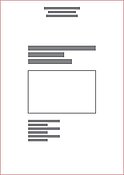 | 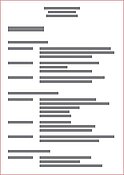 | 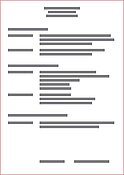 |
| Cover sheet (optional) | Résumé page 1 | Résumé page 2 |
The date should be in the left column and formatted in a uniform style for all stages. Months and years are sufficient.
In the right column, the most important information on the individual stages is displayed. Here, too, it is important to ensure a uniform and comprehensible presentation. The reader should be able to see at first glance:
- Where did you study or work?: School/university / institution / company / name including location in each case
- What degree did you gain there or what position did you hold?: (Aspired) degree / position / occupation
- What did you learn during this time that is relevant for your application?: List important details (final grade / focus / thesis / areas of responsibility)
In the last section of your résumé you have the opportunity to write something about your knowledge and interests. It is also important to state the extent of this knowledge and interest.
Have your language level assessed in advance by a placement test in the Language Centre or make a (realistic) self-assessment. You should always remain aware that interviewers might switch to another language during the interview and you are expected to demonstrate the language level you have listed on you CV. The level can, for example, be described in this way:
- Basic knowledge / fluent / business fluent
- Reference to the European Reference Framework (A1 - C2)
For your software and programming knowledge it is also recommended to do a self-assessment. This could look like the following:
- Basic knowledge / Good knowledge / Very good knowledge
- Indication of the scope / context in which the programme was used
If you like, you can also indicate two or three private interests. If possible, don't just list key points, but describe your hobbies or interests in a short sentence.
At the end of the résumé, which is a maximum of two pages, you insert the current date and your (scanned) signature.
You have gathered your application documents and want to get some feedback? We will be happy to give you feedback in a personal meeting.
An unsolicited application is an application without a previous job advertisement or invitation to send application documents. This can be highly efficient because experts assume that two thirds of all jobs are not advertised publicly. Employers repeatedly point out on their career pages that unsolicited applications are also welcome.
Advantages of an unsolicited application
- If there are currently no vacancies in the company, the HR manager can also consider unsolicited applications at a later date. If there are new positions or vacancies, you will be contacted quickly.
- If you apply online via your own career area, you may be "saved"!
- Many companies have an entire database of applicants from which they pick potential candidates.
- No direct competition, as there is no concrete job advertisement
- Focus on your own qualifications, since there are no requirements
- Freedom of scope: It is your own decision whether to submit an application folder or a short application.
- Self-determined application time
- If you are not accepted right away, there is still the possibility of chances in the future
Steps to your unsolicited application:
1. Employer of choice - the research
- Collect information about the company and the industry in every type of media: Website, Social Media, Careerportals and profiles from (former) employees, Specialist journals
- Check old job offers from the employer of your choice and pay attention to the requirements mentioned
- Collect advertised ‘dream jobs’ and analyse them with regard to the job descriptions and requirements mentioned.
- Are certain qualities particularly desirable?
- Get in touch: Make contacts at trade fairs, Locate the personnel manager and write to them directly
2. The path to your dream job - preparing a unsolicited application
- Draft a job profile for the desired position:
What tasks do I want to fulfil?
How much responsibility do I want to take on?
How should the position be categorised within the company?
For this purpose, we recommend that you have your potential analysed by our consultants. The potential analysis is used to create your individual skills profile. It systematically analyses your skills and identifies your personal strengths.
3. What is important in a speculative application? - Writing a speculative application
In such cases, the recruiter has no requirements profile to compare your details with. This is why it is particularly important in an unsolicited application to describe specifically what qualifies you for a potential position in the company.
You should make this as clear as possible in your cover letter,
- In which area of responsibility and in which position you would like to work
- What fascinates you about this field of work and the company
- Why you are a good fit for the team
- What you will contribute to the company's success
- What professional goal you are aiming for
- What skills and professional successes you have (describe using examples!)
Literature tips: E-Books in the University Library
- Bürkle, Hans: Aktive Karrierestrategie. Erfolgsmanagement in eigener Sache. Springer Gabler. Wiesbaden 2013.
- Rohrschneider, Uta; Lorenz, Michael: Die besten Bewerbungsmuster. Haufe. Freiburg 2009.
- Hofert, Svenja: 30 Minuten Bewerbungsanschreiben. GABAL. Offenbach 2012.
- Stützer, Andreas: Erfolgreich bewerben als Akademiker:in : von der Vorbereitung bis zum Vorstellungsgespräch. UVK. München 2024.
- Pflaum, Stephan: Kompass Digitale Bewerbung : für Student*innen und Absolvent*innen. Springer. Wiesbaden 2023.
Literature tips: Books in the Career Library
- Barsch, Petra: Jobhunting. Geht doch! Karriere mit Knicken. BusinessVillage. Göttingen 2016.
- Hagmann, Jasmin; Hagmann Christoph: Die besten Bewerbungsmuster Bachelor/Master. Haufe. Freiburg 22009.
- Hesse, Jürgen; Schrader, Hans Christian: Das perfekte Anschreiben. Stark. Berlin 22016.
- Kanzler, Sabine: Die perfekte Bewerbung. Vahlen. München 2011.
- Kühnhanss, Christoph: BeWerben ist Werben. Ullstein. Berlin 62011.
Have your application papers been convincing? If so, the invitation to the interview marks the last step in the application process. You will be successful if you are well prepared, respond to the expectations of the company and remain authentic.
In the preparation period, you will inform yourself about the company, become aware of your strengths with regard to the job requirements and practice your self-presentation. Think in advance about your salary expectations and good questions that you would like to ask your employer.
Typical interview process
- Greeting, small talk and short introduction of the persons
- Information about the company and the position
- Questions to the applicant
- Questions to the company’s representatives
- Outlook and farewell
Typical topics for questions
- Motivations for the application and career goals: Why this company, why this job?
- Personal questions: Which qualifications and skills do you have? How can you prove your strengths? Do not hide your weaknesses, but rather show your ambition to work on them, e.g. you are very nervous before presentation and are therefore taking an improv course. What are your career plans? Be prepared for questions intended to pressure you and questions about how your work performance and work ethic.
- Previous position(s): What went well, what went badly? Reasons for change of studies and job, your role in the team
- Conclusion of the conversation: Questions about starting date, salary expectations and further procedure
Literature tips: E-Books in the University Library
- Müller-Thurau, Claus Peter: 101 Fragen und Antworten im Vorstellungsgespräch. 4., aktual. Aufl. München: Haufe-Lexware 2019.
- Köck, F. M. (2019): Das ganzheitliche Vorstellungsgespräch : ein Leitfaden zur Kompetenzsteigerung. Freiburg: Haufe-Lexware GmbH & Co KG .
- Stützer, A. (2024): Erfolgreich bewerben als Akademiker:in : von der Vorbereitung bis zum Vorstellungsgespräch. München: UVK Verlag.
- Müller-Thurau, C. P. (2019): 101 Fragen und Antworten im Vorstellungsgespräch - inkl. Augmented- Reality-App. Freiburg: Haufe-Lexware GmbH & Co. KG.
- Pflaum, S. (2023). Kompass Digitale Bewerbung : für Student*innen und Absolvent*innen. Wiesbaden: Springer.
- Fieg, G. (2025). Ungewöhnlicher Ratgeber für Studierende : Alles, was Studierende für das Vorstellungsgespräch wissen sollten. Wiesbaden: Springer.
Literature tips: Books in the Career Library
- Müller-Thurau, Claus Peter: 101 Fragen und Antworten im Vorstellungsgespräch. 4., aktual. Aufl. München: Haufe-Lexware 2019.
- Köck, F. M. (2019): Das ganzheitliche Vorstellungsgespräch : ein Leitfaden zur Kompetenzsteigerung. Freiburg: Haufe-Lexware GmbH & Co KG.
- Stützer, A. (2024): Erfolgreich bewerben als Akademiker:in : von der Vorbereitung bis zum Vorstellungsgespräch. München: UVK Verlag.
- Müller-Thurau, C. P. (2019): 101 Fragen und Antworten im Vorstellungsgespräch - inkl. Augmented- Reality-App. Freiburg: Haufe-Lexware GmbH & Co. KG.
- Pflaum, S. (2023). Kompass Digitale Bewerbung : für Student*innen und Absolvent*innen. Wiesbaden: Springer.
- Fieg, G. (2025). Ungewöhnlicher Ratgeber für Studierende : Alles, was Studierende für das Vorstellungsgespräch wissen sollten. Wiesbaden: Springer.
The Assessment Center (AC) is a standardised procedure for the selection of applicants in which you have to cope with various realistic individual and group tasks - in other words, work simulations. You will be judged by trained observers. During the breaks between the exercises you are under observation as well. The aim of the selection process is to check your suitability for the advertised position, determine existing competences and soft skills and make predictions about your future professional development.
Furthermore, companies are incresingly either no longer conducting a complete Assessment Center or no longer calling it one. Instead, terms such as extended interview, selection days, group selection process, recruiting workshop or Development Center are used.
Companies expect you to have prepared for AC with books, other people's testimonials, or even exercise simulations. If you take part unprepared, you will most likely fail. For example, you can use this free preparation tool: https://www.assessment-center-kurse.de/ac-training-kostenlos/
TASK TYPES
Case Studies
Case studies show how you work on a particular task. The focus is not only on the solution, but also on your approach. You should be able to justify your approaches well. Usually, case studies are only dealt by one candidate, but group tasks are also possible.
Group discussion
Group discussions are about finding a solution to a problem in a team or making a decision, discussing a certain topic or solving a company-related task. For the group discussions you can be given roles or interests and goals or you can freely choose a position.
Interview
In an individual or small group interview you may encounter questions such as in a job interview or be asked to reflect on your performance in AC. A special form of interview is the stress interview, in which you are asked various questions in quick succession or are reproached for poor performance in order to see how you react under pressure.
Role play
The role play is a simulated interview between the applicant and an AC observer or between two applicants. The topics are tailored to the company and the future field of activity. Often these are problematic employee interviews or meetings. Frequent topics are: salary negotiations, difficult sales talks, talks about an employee's poor performance or conflicts within a department.
Personality, performance and intelligence tests
The purpose of these tests is to assess the applicant more precisely. For example, personality tests form a basis for assessing the character of a candidate, whether an applicant fits into the team or what his or her work and social behaviour is like. Performance and intelligence tests test the candidate's ability to think logically, to concentrate, or his/her general or specialist knowledge. Language skills are also likely to be verified.
Mailbox Exercise
In the Mailbox Exercise you will be tasked with working through a large number of simulated documents or completing tasks under time pressure. As it is usually not possible to complete all tasks within the given time, you will have to quickly grasp the facts, set priorities and make well-founded decisions. Your decisions can then be explained in a presentation or an interview. Be prepared for spontaneous incidents, such as a ringing telephone or documents handed in later.
Estimation tasks/Brainteaser
Not only in job interviews, but also in the Assessment Centre, estimation tasks or brainteasers are a popular means to test candidates. It is more important to see the reaction and the solution approach of an applicant than a correct problem solution. Typical tasks can be prepared with the following book: Das Insider-Dossier: Brainteaser im Bewerbungsgespräch. 140 Übungsaufgaben für den Einstellungstest. Hrsg. v. Stefan Menden.4., erw., aktual. und überarb. Aufl. Köln: squeaker.net 2010.
Self-presentation
Self-presentation can take place as part of a round of introductions or as an individual presentation. The questions are based on topics that are also relevant for the interview, such as your own career, successes, professional goals and your particular motivation for the job.
Presentations
You will be asked to prepare a presentations ina very short time and with a slightly longer lead time (preparation until the following day). Your task is to understand the content of a specific topic and to communicate it to your target audience. Often you will have to take a certain point of view, make recommendations or convince others of what you have to say.
Business Dinner
Although eating together (whether in a restaurant or in a canteen) has a seemingly informal character, it is often part of the tests or at least contributes to the overall impression. At a business dinner, observers can see whether you are proficient in table manners, how experienced you are in small talk, and whether you can adequately represent the company in these situations.
Literature tips: E-Books in the University Library
- Eck, Claus D. / Jöri, Hans / Vogt, Marlène: Assessment-Center. Entwicklung und Anwendung – mit 57 AC-Übungen und Checklisten. 3., überarb. und aktual. Aufl. Berlin, Heidelberg: Springer 2016.
- Hagmann, Jasmin: Assessment Center. 2., aktual. Aufl. Freiburg: Haufe-Lexware Verlag 2019.
- Obermann, Christof: Assessment Center. Entwicklung, Durchführung, Trends. Mit originalen AC-Übungen. 6. Aufl. Wiesbaden: Springer Fachmedien 2018.
Literature: Books in the Career Bibliothek
- Hesse, Jürgen; Schrader, Hans Christian: Assessment Center für Hochschulabsolventen. Stark. Berlin 2012.
- Lüdemann, Carolin; Lüdemann, Heiko: Topkandidat im Assessment-Center. Redline. München 2008.
- Lüdemann, Carolin; Lüdemann, Heiko: Leistungstests souverän meistern. Redline. München 2007.
Although an application photo is not mandatory in Germany, it is often expected. As a supplement to the documents, it underlines the professionalism of the applicant and emphasizes the seriousness of the application.
For the "perfect" photo you should consider the following:
- Go to a professional photographer and don't use any machine pictures or private snapshots. Ordinary (biometric) passport photographs are also unsuitable for applications. A professional photo, on the other hand, underlines your competence and the seriousness of your application. The higher the position, the more professional the photo should be.
- Whether the photo should be in colour or black and white depends mainly on the personal taste of the applicant, but is also subject to the latest trends among photographers. The most important thing is a friendly, present facial expression and a clear view of the applicant. Therefore, spectacle wearers should make sure that their eyes are not overshadowed by the spectacle frame or that the lenses don’t reflect, thus making direct eye contact impossible.
- The photo should also be tailored to the future employer or industry. In creative professions, you can be more experimental. In companies that attach great importance to tradition or respectability, you should rather decide for a classic portrait. A good photographer will advise you accordingly and also adjust your clothes to your future position.
- General rule for clothing: Wear an outfit for the application photo that you would put on for the interview (but not necessarily the same) and that suits the industry and company. If possible, you can also bring a selection of clothes to the photographer to decide on the best outfit together. A good indication of what the company's dress code looks like can be found on employee photos on the company website.
- Minor redness, spots or skin blemishes on the photo may be retouched, but avoid extreme changes in image processing. The HR manager should be able to make a connection between you and your photo.
Photographers in Würzburg, with whom we have already worked:
- Daniela Hütter Fotodesign
Our photographer at the application photo shooting of the Career Centre
https://www.daniela-huetter.de/ - Fotografie Petra Winkelhardt
Cooperation at events and for application photos
www.foto-winkelhardt.de
You should always sign your cover letter and CV. If you are submitting your application digitally, you should make sure that your signature is inserted professionally. The best way to do this is to insert the signature as .png. You can find out how to do this in this set of slides(in german).
companize.com
The Companize evaluation platform is used for the anonymous and fair assessment of employers.
glassdooor.de
The Glassdoor career platform offers company ratings from the employees' perspective. There is also an option to compare salaries.
jobvoting.com
The Jobvoting platform has been in existence since 2006. It currently lists more than 100,000 companies in its database.
kununu.com
Kununu is an online evaluation platform. The aim is to obtain authentic statements about employers through employee ratings.
meinchef.de
The assessment of employers is divided into various categories, including equal opportunities, work-life balance and corporate culture.
meinpraktikum.de
Here you will find personal experiences of former interns, authentic company insights and internship and working student positions.

